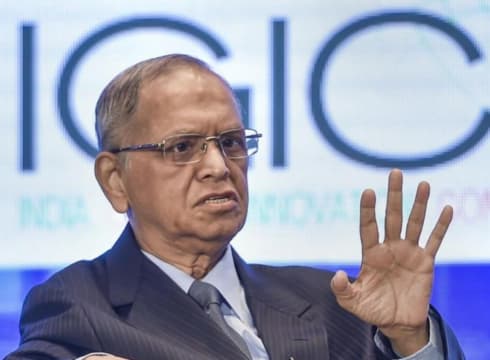ChatGPT is an excellent addition to knowledge generation, but, human mind is the most powerful imagination machine, said Murthy
Willing to use ChatGPT as an instrument to produce better quality of work and output, but not as a replacement for humans, added Infosys cofounder
This comes weeks after Zoho boss Sridhar Vembu warned that AI could put millions of jobs at risk overnight and could be potentially catastrophic
Inc42 Daily Brief
Stay Ahead With Daily News & Analysis on India’s Tech & Startup Economy
Even as experts and industry players across the globe seek regulatory ring fencing of emerging AI technologies, Infosys cofounder Narayana Murthy appears unfazed.
In an interview with CNBC, Murthy said that nothing, not even AI chatbots such as ChatGPT, can beat the human mind. While noting that the language processing tool was an excellent tool for knowledge generation, he asserted that the human mind was the ‘most powerful imagination machine.’
“ChatGPT is an excellent addition to knowledge generation, to doing certain tasks, for example, writing an essay… I am a great believer in the theory that the human mind is the most powerful imagination machine. There is nothing that can beat the human mind,” Murthy was quoted as saying.
Reinforcing his point, the Infosys cofounder said that he was willing to use ChatGPT as an instrument to produce a better quality of work and output, but not as a replacement for humans. Noting that the human mind is what differentiates human beings from each other, he further drove his point by drawing parallels with the interviewer.
“But let’s remember, both you and I have access to the same ChatGPT… If there is a competition between you and me, you will use the ChatGPT output as your base, and then you will add your own differentiation, your own smartness, your own tweaking… The lazy guys will get C. Only smart people will get A,” added Murthy.
He further claimed that he was not worried about ChatGPT ‘much.’
This echoes a similar comment made by edtech decacorn BYJU’S’ cofounder, earlier last month at Inc42’s The Makers Summit 2023. She had said that ChatGPT could reduce the burden of mundane tasks and increase productivity. She also said that it was not not about tech versus people but rather tech and people, especially in the education space.
Murthy’s statement comes amid an ongoing debate over whether chatbots like ChatGPT will take over human jobs. Globally, many advocacy groups have called for a stop on technologies stronger than GPT-4 for at least six months.
Earlier this month, Auto-GPT also made its debut. It is built atop GPT-4 and possesses the ability to perform tasks autonomously to achieve objectives sans human intervention.
Back home, the emergence of AI technologies such as ChatGPT and GPT-4 has stirred a massive debate. Earlier this month, ace entrepreneur and Zoho cofounder wrote an open letter to the union government and called for building global consensus on regulation and effective utilisation of AI.
Leaving nothing to the imagination, he said that AI could put millions of jobs at risk overnight, adding that the emerging technology could be the ‘harbinger of chaotic and potentially catastrophic consequences for humanity.’
While noting that AI was brimming with transformational potential, Vembu claimed that adopting such new technologies without proper guardrails could lead to ‘unprecedented disruption of the existing social order’.
As the matter caught steam, Union Minister Ashwini Vaishnaw specified in the Parliament that the government was not looking to regulate the AI space. While flagging ethical concerns and risks with AI tech, Vaishnaw also termed AI as a significant and strategic area for the country.
Centre’s Backs AI Push
Largely, the centre has viewed AI as having a ‘kinetic effect’ on the growth of startups and business in the country. It has also scaled the deployment of such technologies for public delivery of services. Last week, it was reported that the union government was building a chatbot helpline, somewhat modelled after ChatGPT, for grievance redressal in multiple Indian languages through audio messages.
Besides, the centre is also working on a slew of initiatives that have AI at its core such as the Digital India BHASHINI project which aims to create an open data and open source platform to spur startups in the domain and to create the next-generation of government websites that will enable users to access public services in their language of choice.
Meanwhile, the centre, in coordination with the Centre for Development of Advanced Computing (C-DAC), is already working on building a common computing platform for AI research and knowledge assimilation, which is projected to be scalable to 1 AI exaflop.
Alongside, the National Informatics Centre (NIC) has already begun work on facilitating AI-as-a-Service (AaaS) on the Meghraj cloud. Then, there are centres for excellence and other initiatives which aim to upskill local youth on emerging technologies such as AI and blockchain.
But, the biggest push to startups has been in the form of the Digital India GENESIS, spearheaded by DPIIT, which aims to support 10,000 deeptech startups over the next 5-6 years.
As a result, the space has also seen the emergence of new homegrown generative AI players such as Sonic Chat, Lei, Rephrase.AI among others. Overall, the India AI software market appears to be on the right track and was estimated to be valued at $2.76 Bn in 2020. The space is projected to soar to a market size of $7.8 Bn by 2025.
{{#name}}{{name}}{{/name}}{{^name}}-{{/name}}
{{#description}}{{description}}...{{/description}}{{^description}}-{{/description}}
Note: We at Inc42 take our ethics very seriously. More information about it can be found here.


